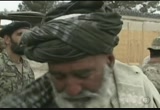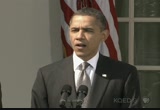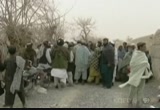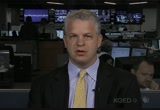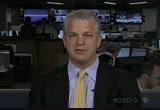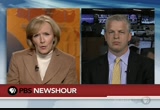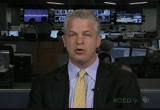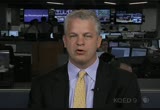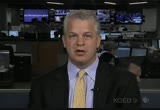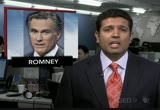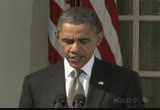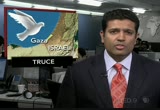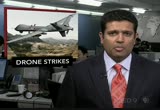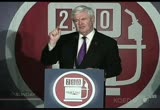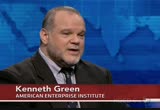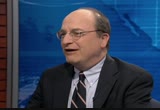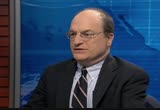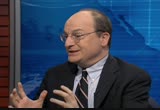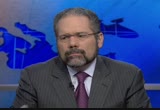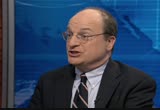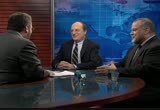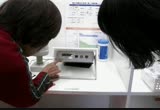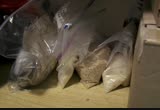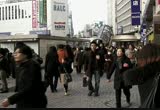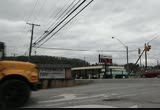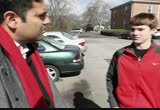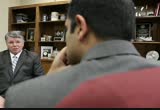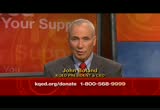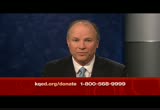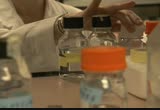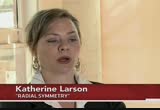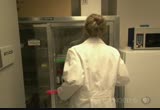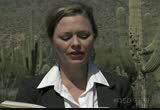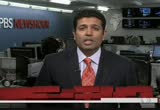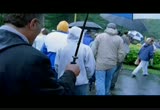tv PBS News Hour PBS March 13, 2012 6:00pm-7:00pm PDT
6:00 pm
captioning sponsored by macneil/lehrer productions >> ifill: president obama today pledged a thorough investigation of the weekend killings in afghanistan, calling them "outrageous and unnacceptable." good evening. i'm gwen ifill. >> suarez: and i'm ray suarez. on the newshour tonight, judy woodruff has the latest on the massacre, and what's known about the suspect. >> ifill: then, as gas prices head toward the four dollar mark and beyond, we assess what can be done to bring them down. >> suarez: in his third and final story from japan, miles o'brien looks at the concerns and confusion over food safety after the nuclear meltdown. >> in tokyo they are promoting produce grown in fukushima-- but they claim it is all tested for
6:01 pm
radiation. cesium readings are posted right beside the price. >> ifill: from our american graduate series, hari sreenivasan reports on a west virginia law that keeps students from getting driver's licenses if they fail to attend school. >> i like the idea of having motivation of doing good in order to get my license. >> suarez: and we close with a profile of a young poet whose career as a molecular biologist shapes her poetry. >> ifill: that's all ahead on tonight's newshour. major funding for the pbs newshour has been provided by: >> moving our economy for 160 years.
6:02 pm
bnsf, the engine that connects us. >> and by the alfred p. sloan foundation. supporting science, technology, and improved economic performance and financial literacy in the 21st century. and with the ongoing support of these institutions and foundations. and... this program was made possible by the corporation for public broadcasting. and by contributions to your pbs station from viewers like you. thank you. >> suarez: new violence erupted in afghanistan today after a u.s. soldier allegedly killed 16 civilians on sunday. at the same time, president obama condemned the killings again in his strongest words yet. and the u.s. military found probable cause to continue holding the suspect soldier.
6:03 pm
>> reporter: gun fire exploded again this morning at the scene of sunday's massacre near kandahar. insurgents opened fire on a visiting delegation of senior afghan officials who had come to pay respects, including two of president hamid karzai's brothers. they were unhurt, but one afghan guard was killed and another wounded. the taliban said it was in retaliation for the killing of 16 afghan civilians allegedly by an american soldier. and in jalalabad, hundreds of afghan students burned an effigy of president obama and a cross. >> ( translated ): we condemn the killing in kandahar by the infidel occupier. and secondly, we want the immediate trial of the culprits for the killing of the martyred victims in kandahar. >> reporter: meanwhile, in washington, president obama tried again to calm the anti-american rage. >> the killing of innocent
6:04 pm
civilians is outrageous and it's unacceptable. it's not who we are as a country and it does not represent our military. and for that reason, i've directed the pentagon to make sure that we spare no effort in conducting a full investigation. i can assure the american people and the afghan people that we will follow the facts wherever they lead us. and we will make sure that anybody who was involved is held fully accountable with the full force of the law. >> reporter: the soldier in custody is a 38-year-old staff sergeant from joint base lewis-mcchord in washington state. pentagon officials continued to withhold his name today pending charges. but they said he served three tours in iraq where he suffered a traumatic brain injury at one point. defense secretary leon panetta, traveling abroad, said the
6:05 pm
soldier could be subject to the death penalty. he also argued that sunday's attack must not undermine the u.s. mission in afghanistan. >> war is hell. these kinds of events and incidents are going to take place in any war. they're terrible events and this is not the first of those events and it probably won't be the last. >> reporter: the taliban demanded today that the soldier be tried as a war criminal and then executed by the victim's relatives. for more on this story and specifically on what is known about the man who allegedly went on this rampage in afghanistan, we turn to craig whitlock, a reporter with the "washington post." craig, thank you for being with us. military officials as we heard are now saying they have probable cause to hold the suspect. abc news was reporting late today of that he had confessed. why aren't they making his that
6:06 pm
i mean public yet? >> i think they're trying to get to the actual bottom of why he did this. there's not much question, judy, of who did this. as you reported, this soldier walked off the base, massacred these villagers, walked back on the base, turned himself in. panetta said yesterday that he essentially confessed. he said he did it. i think they're trying to figure out why he did it. they don't know if it was some sort of mental scars from his previous deployment. military officials said they were looking into whether alcohol found on this small military base may have played a role. in short, they don't know what led this guy to snap and walk off the base in the middle of the night and gun down and apparently burn 16 afghans, including... most of them women and children. >> woodruff: it's reported he's a trained sniper. what more is known about him. you mentioned a possible emotional or mental issue. we know there's been reports that he was involved... a report that he was involved in a
6:07 pm
vehicle turnover, a traumatic brain injury as a result of that back in iraq in 2010. >> that's right. as we reported today, he's had multiple deployments in iraq. he was there on at least three different occasions. nine to 12-month tours in iraq. this was his first one in afghanistan. he arrived in afghanistan in december. but in 2010 in iraq he was involved in a vehicle rollover. he was treated and diagnosed for a traumatic brain injury. we don't know the extent of that injury. we don't know if it was a concussion, something much worse. it's a fairly common injury diagnosed in perhaps a couple hundred thousand troops over the last ten years. it's something that army doctors are just trying to figure out... somebody may not show signs of visible injury but it can manifest itself in different ways later on. now, just because somebody suffered an injury like that doesn't mean they're apt to walk
6:08 pm
off a base in the middle of the night and massacre a bunch of afghans. i think that's what the army investigators are trying to figure out. was that a contributing factor? was it the repeated deployments? was it something else? i think they'll still trying to nail that down and perhaps nail down a motive before they file charges and identify this person. >> reporter: craig whitlock, you had interesting reporting in the post today about the place where he is stationed in the united states, joint base lewis-mcchord in washington state. and some incident there is. can you expand on some of that? >> yes, sure. one problem they have is this military base in washington state is the biggest military installation in the pacific northwest. they've had many, many troops go to iraq and afghanistan. they had problems in their medical center with treating troops on the way home not only for visible injuries but for post-traumatic stress disorder,
6:09 pm
brain injuries, things of that nature and the number of critics at the base, veterans groups, anti-war activists have said that the medical center there has a history of finding... filing paperwork to say soldiers are fit for duty and can ship out again in short periods without giving a chance for them to fully rue coupe rate. there's a number of investigations going on and a couple medical staff have been put on leave and it looks like there have been at least a few hundred case wrrs soldiers were diagnosed with post-traumatic stress disorder initially, those diagnoses were later downgraded, whether to enable these soldiers to fight again or reduce health care costs. again, whether that was a factor in the case of this soldier in afghanistan near kandahar on sunday we don't know, but we do know there's a pattern of these problems at that base. >> reporter: and, again, that was going on at the time that he would have been there in between deployment. >> exactly.
6:10 pm
so military investigators are scrutinizing not just what injuries he may have had in his previous deployments but they want to take a very careful look at whatever doctor would have had to sign off on him being fit to return to duty. what kind of test was he given? how extensive was it? where there any internal disagreements over that? did the soldier or his superiors object saying that he needed to be watched more closely. and that's the kind of thing they're going back and coming through his medical records, his personnel records to determine whether this could be a factor, whether he was fit to return to duty. >> woodruff: and one other thing about joint base lewis-mcchord in washington state, craig whitlock, and that is there there have been reports... well, incidents of soldiers base there had who have gone rogue, in effect. >> that's right, judy. we reported on this extensively last year and the year before. there was another army unit, a plat platoon from lewis-mcchord in 2010 that members of that
6:11 pm
platoon have been convicted of killing three unarmed afghan civilians. they called themselves a kill team. and it was not far from where this soldier on sunday was assigned. different group, different soldiers. again, there were reports of what were the motives? what would have led these soldiers to do this over a period of time, hunt down innocent afghan civilians. they dismembered some of the corpses, kept fingers for body parts. it turned out the ringleader in that case had also been to iraq before. his background was heavily scrutinize bud it turned out there was no apparent reason why he would do this. no medical reason, he had no history of substance abuse, no history of brain injury. he just... like you said, he went rogue. and sometimes there is no logical explanation for why people do these things. >> woodruff: we know in this case the investigation continues. craig whitlock from the "washington post," thanks very much. >> ifill: still to come on the newshour, high prices at the
6:12 pm
pump; testing food in japan after fukushima; no school, no driver's license; and poetry from a scientist. but first, with the other news of the day, here's hari sreenivasan. >> sreenivasan: the deep south was the big target today in the republican presidential nominating race. alabama and mississippi held primaries, and accounted for 90 of the 107 delegates at stake today. rick santorum hoped to win the two southern states and emerge as the main rival to mitt romney. by most accounts, newt gingrich needed a strong showing in at least one of the states. and romney was making a late run to try to score an unexpected southern victory. republicans in hawaii and american samoa were also voting today. wall street roared ahead today on improving economic news, and a rally in bank stocks. the dow jones industrial average gained nearly 218 points to close at 13,177. the nasdaq rose 56 points to close near 3040. it was the first time the nasdaq has finished above 3,000 in more than eleven years. the fight over china's curbs on exporting rare earth metals heated up today.
6:13 pm
the metals are critical to everything from advanced batteries to hybrid cars, and china has been cutting its exports. the u.s., japan, and the european union filed a complaint today with the world trade organization. at the white house, president obama warned against trying to "skirt the rules" of international trade. >> being able to manufacture advanced batteries and hybrid cars in america is too important for us to stand by and do nothing. we've got to take control of our energy future and we can't let that energy industry take root in some other country because they were allowed to break the rules. >> sreenivasan: china accounts for 97% of the world's production of rare earth minerals. four of the largest u.s. banks have failed a new round of stress testing by the federal reserve. citigroup, the nation's third- largest bank, was among them, according to results released today. ally financial, sun-trust, and metlife also failed the annual tests. the fed said 15 other banks would have enough capital to weather a future financial shock.
6:14 pm
rebels in syria have suffered another defeat. the army today recaptured most of idlib, after a three-day operation. the city had been a rebel stronghold since last summer, but witnesses said the fighters had begun to run out of ammunition. today civilians huddled in basements in idlib to stay safe. above ground, remaining rebel fighters patrolled the streets, and families dodged snipers, trying to get out. the worst israeli-palestinian violence in more than a year came to an end today. egyptian officials brokered a truce, ending four days of fighting. but leaders on each side said the burden is on the other to keep the peace. >> the palestinians could have gained a great deal by peace by far more (inaudible) the hope resides in peace. >> ( translated ): we don't trust the zionist enemy at all
6:15 pm
because he only thinks of killing more palestinians. but we trust the palestinian resistance and its leaders and, of course, we trust the egyptians. they can force the zionist enemies to be committed to the truth. >> sreenivasan: the violence started on friday after the israelis killed a militant commander in gaza. in all, at least 24 palestinians died in air strikes. israeli police say militants fired more than 200 rockets into israel, but no one was killed there. pakistani officials reported two more missile attacks by u.s. drone planes today, killing 15 more suspected militants. the pakistanis said the dead included two senior commanders of the pakistani taliban. both strikes occurred in the waziristan tribal area along the rugged border with afghanistan. those are some of the day's major stories. now, back to ray. >> suarez: the u.s. economy gave off new signs of momentum today, from retail sales to the federal reserve's latest outlook. they provided reasons for optimism, even as rising gas prices gave cause for concern.
6:16 pm
american shoppers are picking up the pace. retail sales rose more than 1% in february, the most in five months. that news followed friday's report that employers added another 227,000 jobs in february. consequently, the federal reserve said today the economy is expanding moderately. but the fed also warned that the spike in gas prices will feed inflation-- at least temporarily. in fact, with gasoline up 30 cents a gallon in the past month president obama is feeling the political heat. he acknowledged as much yesterday in washington. >> as long as gas prices are going up, people are going to feel like i'm not doing enough and i understand that because people get hurt when they're going to the gas station and seeing the prices rise everyday. >> suarez: and two new public opinion surveys suggest the issue is hurting the president's ratings. a "new york times"/cbs poll found 47% of americans now disapprove of how he's handling
6:17 pm
the job while just 41% approve in a "washington post"/abc poll it was 50% disapproval to 46% approval. sensing an opening, the president's republican rivals pounced. mitt romney lampooned mr. obama's explanations today in st. louis >> he says something... i think it was yesterday. he said the reason we have high gasoline prize prices is-- and then he was seeking around. what could it be? what could it be? >> suarez: and former house speaker newt gingrich promise head would push policies to bring gas prices down to $2.50 a gallon. mr. obama der rides such claims saying anyone who makes them isn't telling the truth. but public sentiment may be building for presidential action and soon. in both the recent polls 50% or more said it's within the president's power to do something about the price of gas we take a closer look now at
6:18 pm
what's driving gas prices higher and what, if anything, the president can do to keep them in check. kenneth green is resident scholar on energy and the environment at the american enterprise institute, a conservative think tank. and daniel weiss is director of climate strategy at the center for american progress, a liberal policy group. gentlemen, welcome. simply, kenneth green can the president-- this president, any president-- push down the price of gas? >> sure they can, but not as much as people might think. about 75% of the price of gas is the world price of oil. but there's a federal gas tax that can be changed, the e.p.a. requirements for specific fuel blends that can be changed. so it's not quite true to say the president has no power but it's not as big as some people might like. >> suarez: daniel weiss, can the president change the price of gas if he or she wants to? >> well, when this happened in 2008 president george w. bush said "i would wave a magic wand if i could to lower prices but there's no such thing." and this's true for this president as well. there is no magic wand to wave. prices are high due to several
6:19 pm
factors. first, there's some supply disruption in the middle east. second that there is a lack of... there's a... increased demand from asia and then third wall street speculators and oil companies are helping to bid up the price of oil on the markets and that is driving up the prices. "forbes" magazine, no bastion of progressism, have said spectators have driven up the price of oil about $25 a barrel. >> suarez: kenneth green, you were shaking your head. is there a shortage of supply of oil? is it supply and demand? >> you know, the evil speculators, this is funny. somehow when the price goes from $3.50 to $4 it must be evil speculators but when it goes from $2 to $2.50 you don't hear about speculators or $2.50 to $2 you don't hear about speculators. we have magical high end speculators that move to only one direction.
6:20 pm
>> suarez: well, wait a minute, though. the price of a barrel of oil has gone up smartly in the recent couple of weeks, but there's no less oil entering the world marketplace than there used to be. so what is it? >> there's more uncertainty over whether or not the oil will make it through the world marketplace and to the refiners and whether the refiners will have the capacity to process it in time for the driving season. there are many risk factors that are priced into the price of a barrel of oil that are intangible but no less real. >> suarez: daniel weiss, not speculation but the price of uncertain any >> well, first of all, there is evidence that wall street speculators and not commercial end users like airlines and other people who have to use the oil, have driven up prices. generally speaking it's about one-third speculators making deals on oil and two-thirds of end users. right now it's the exact opposite. mcklatch chi news service found that currently wall street speculators make up almost two-thirds of all trades. in addition oil is set on a
6:21 pm
world market. we can't really affect it that much. right now we're producing the most oil we've produced in eight years. we're using the least since the clinton administration yet prices are still high. we've seen oil rigs quintuple in the amount we've got drilling for oil yet gas prices are still rising. so because oil is on a world market, we don't really have the ability to affect it very much. there are a couple things the president can do to lower prices quickly, not the things that were suggested earlier, but taking some of our reserve oil. our reserves are almost full, putting hit in the marketplace like we've done with our other president has tended to burst that speculative bubble. change the expectation that the market is only going to be increasing in price and therefore has led to a decline in prices every time we've used that tool. >> suarez: you have suggested that a president can push down the price of oil. should will this be understood as something that a president
6:22 pm
does temporarily when the price of oil spikes just to smooth out abrupt changes in the price? or is oil something that could be cheaper, period? >> well, all three of the above. it could be cheaper period. there could be permanent changes such as the fuel requirement that can bring the price down in a lasting way. we could increase production, which would have some effect in a lasting way. there were short term changes that can be made such as suspension of the federal gas tax working with states to suspend the state gas taxes. those can be temporary or long-lasting so there are things that can be done both in the short term and the long term to bring down gas prices but whether it should be done is a political calculation more than an economic one. >> suarez: what about daniel weiss' suggestion that we're already getting a lot of oil from the united states and since it is trading on a world market if you develop a new field somewhere in the united states you won't sell it at some special american price you'll
6:23 pm
sell it for what it's selling on the stock markets in london, crude and so on. >> yes, and no. but the that logic were true than the president's approval of the most recent pipeline to bring oil from to the gulf coast would make no sense. in fact, the president said we have oil that's stranded in the middle of the country where it's commanding a lower price and commanding a higher price so f it can get to markets so it's not true to say more production won't temporarily give you lower price oil. it will. canada oil is discounted because the price to move it from alberta to any coast to get it for any market so we buy it for less than we would buy oil from saudi arabia or from tankers from abroad. it's not true to say you can't drop the price by producing oil. you can. it's a matter of how long it will last and how far it will spread. >> suarez: we've talked about cause. let's talk about effect. is this spike of oil and oil products enough to mug a recovery that might be gaining
6:24 pm
some momentum? >> there's plenty of evidence that high oil prices reduce economic growth and that the higher oil prices go the slower our growth will be so that's a danger. second, high gasoline prices have a real impact on middle-class and low-income families. it has a real cost. that's why if we can take our reserve oil-- our reserves are full-- put it on the market, about 30 million barrels, get our allies to do about the same, pop that speculative bubble, speculators won't count on the price going up so they'll change expectations that will lower gasoline prices and provide some relief. in addition with need the regulatory agency that overseas oil trade to crack down on wall street speculators they have a number of powers they can use under the dodd-frank law that was enacted but they haven't put them into effect. they need to do that to again put cops on the beat to make sure that people aren't driving up the price just to make money. >> suarez: kenneth green?
6:25 pm
>> we agree on the negative check impact. that's true. the higher the prices, the worse the effect and the more aggressive they are. we disagree on using the idea of using strategic petroleum reserve because saudi arabia could crank down its production much more than we could ratchet it up in the tiny short term with the strategic petroleums which is small on a world supply. so we have a problem but we don't agree on a solution which is no no surprise. >> suarez: but if you can get the two of you to agree on something we've done a good day's work. gentlemen, thanks a lot. >> thank you. the. >> ifill: next, the last in our special series on the aftermath in japan, one year after the nuclear accident at fukushima. newshour science correspondent miles o'brien has been reporting on the continuing concerns in the evacuated region and surrounding area, including fears of contamination. tonight how japanese citizens are grappling with very real questions about farming and food
6:26 pm
>> reporter: in his barn, this rice farmer has all the latest gear get the job done. his planter will sew six rows at a time but his pharma sheens are in mothballs and his fields lie fallow. he and his wife are back home-- alone-- in a village about 13 miles from the fukushima daiichi nuclear power plant. the village is not officially in the mandatory evacuation zone but it is contaminated with cesium fallout and the farmers were told not to plant their rice fields so the place is all but abandoned. "i was born and grew up here" he told me. "but this land and these houses are inherited for generations, we have to protect them so we can't help but return."
6:27 pm
but it's not easy living here now. the family drives more than an hour just to stock the fridge. and everywhere they turn, they are reminded of happier times. when they measured their children's height on this door frame. so this is... they showed me pictures of them and the grandchildren-- all gone now because they don't believe it's safe to live here anymore for fear of radiation contamination, in the air and in the food. in food, radiation contamination is commonly measured in a unit known as beck rells. the government here initially set the limit at 500 per kilogram but there is talk of lowering it to 100. the limit in the u.s. is ten times higher. >> reporter: the standard is indispensable for everyone to feel safe, but the confusion about what levels are truly safe
6:28 pm
has triggered widespread unease all over japan. people are skeptical of government assurances the food is safe. so an ad hoc cottage industry of testing services is filling the void. business is robust in this testing facility, a hot spot in the outskirts of tokyo. the manager says they have measured food with several hundred becquerels of contamination. this woman came here to test food from the place her son's kindergarten class was headed on a strawberry picking field trip. it turns out the berries were safe and the trip was a go. "those who have little kids or grandchildren are careful about milk, mushrooms and some other foods," she said. at this store in tokyo, they are promoting produce grown in
6:29 pm
fukushima-- but they claim it's all tested for radiation. cesium readings are posted right beside the price. the manager says it's the right thing to do for farmers enduring such hardship. "most crops read below 10 becquerels. actually measuring radiation we realize there are not so many reading high radiation so it's important to inspect and release information. then farmers can confidently ship their crops and customers can feel safe to buy them. i hope this kind of effort spreads." >> reporter: but this woman is not so sure. she channeled her worries into a nonprofit in fukushima city that sells produce she purchases from outside the regions. when a shipment comes in-- as these dry radishes did on the day we met-- she walks a few blocks to a testing center to ensure they are okay to eat. turns out these were harvested
6:30 pm
before the meltdown and most certainly safe so they were fine to put on the shelves. do you think it's not safe to buy food at a typical market right now? "i think food in the market is not safe," she said. if data is released to the public i would feel safe. i'm concerned because an inspecting system has not been established yet. that's why this woman shops for her children here. "i'm concerned" she said. "i can't trust the safety standards set by the government. many here believe the government is placing business interests over people's health it turned this woman and her american ex-pat husband david moore into radiation testing activists. sglrp two inch sodium iodide,
6:31 pm
thallium. >> reporter: they have spent more than $5,000 on sophisticated radiation sensors and then began testing their tokyo neighborhood for hot spots bringing contaminated soil back home because there's no place to legally dump it. there's no place to put it? >> no. >> now we've got 1,238 followers. >> reporter: they started posting their readings on a facebook page and people send them a steady stream of soil and food to test. he says food from fukushima should be banned entirely, the farmers compensated for their losses. the >> the only thing to do is to cut the product from the market 100% until we can guarantee a certain amount of stability. wow! you want to play something or watch something? >> reporter: for now, they are feeding their young boys purified water, rice harvested before the meltdown and food they feel certain is safe.
6:32 pm
>> we... i don't know anybody else who spends as much time, labor, and money as we've done around us. >> reporter: worth it? >> yes. yes. because (inaudible) we're responsible. >> reporter: but the stress has taken a toll and they will soon be moving back to the u.s. so how long will people in japan be dealing with this problem? many farmers here were dismayed to learn crops that did not have any direct contact to the fukushima fallout were still too tainted to be brought to market. >> they were a little bit surprised at how much of the cesium translocated from the old leaves into the new growth, particularly in the tea leaves. >> reporter: this radio ecologist is reading fukushima tea leaves at oregon state
6:33 pm
university. she studies how radio nuclei move through the environment. >> when the initial releases occurred, the radio nuke collie eye contamination fell to the ground and contaminated the old mature leaves and later on as the weather warmed up and you started getting new growth what they found in the tea leaves was that the new growth was also contaminated. >> reporter: whatever the mechanisms this man is not waiting for the soil to be safe enough for rice. he and other farmers who used to build here are thinking of building greenhouses to grow vegetables hydrouponally. "i believe everyone is angry about this situation because our lives are devastated" he told me. "it's furious anger, but how can we express our anger?" and fully aware of the irony, he took me to another barn to show me this-- the bags of rice this
6:34 pm
life-long rice farmer had to buy at the market. >> suarez: for millions of high school students, getting a driver's license is a rite of passage. but increasingly, some states and school districts are linking the chance to get a license with requirements that students stay in school and perform academically. that's the focus of our story tonight, part of our "american graduate" series on the nation's high school dropout crisis. hari sreenivasan reports. >> reporter: for 17-year-old chelsea, a driver's license means the chance to get to and from her after school job as a dance instructor more easily and the freedom to do so without her mother sitting next to her. >> mom, i'm not moving! just fine to be able to go out and not have to worry about certain times and my parents being late picking me up or too early or stuff like that. i kind of make my own rules with
6:35 pm
certain stuff. >> reporter: she and other students here at the high school in west virginia are taking a driver's education course to learn the rules of the road. but in order to receive a license right now, she has to not get into trouble, attend class regularly, and be on track to graduate before she's 19. >> i mean, i like the idea of having the motivation to do good in order to get my license. >> reporter: and she can thank patrick murphy for that. in 1988, while serving in the state legislature, he introduce the bill that made west virginia the first state in the country to adopt a so-called attend and drive law. murphy says the law was an attempt to keep students in school longer at a time when the state was dealing with a serious dropout problem and lack of funds. >> we were probably losing a third of our students. we found out... n this issue we found some students were dropping out of school in order to get a job to keep the car on the road. >> reporter: the principal says
6:36 pm
many of his students really want the independence a driver's license can bring and that he's seen the law work firsthand. >> we have had several students that have been borderline students and i feel just because of the current policy or given them an incentive to do better because kids love to drive. there's one niche of kids i think we were able to target but it... we had other groups it did impact. >> and that's still true today. the law does not always impact students who consider dropping out. >> my grades were low and you have to pass like four classes. >> reporter: bad attendance and grades meant this student did not get her driver's license but she says the policy had nothing to do with why she's staying in school. >> i'm going to make it through since i don't have that much longer to go through. >> reporter: the dropout rate in west virginia has fallen some
6:37 pm
over the years, but no one has shown this law was the cause. despite that, 21 states have followed west virginia's lead in adopting similar legislation and the policies vary from state to state. for example, in arkansas students must comply with attendance policies and maintain a 2.0 grade average in order to stay eligible to drive. while in mississippi teenagers who want to drive must simply show proof of enrollment. matthew leonard says there is no proof these policies work. he studied the issue for the southern regional education board. >> it's a relatively low-cost prescription for keeping kids in school or bringing them back. the driver's license is an important status symbol, it appeals to parents and students and if you threaten to take that away it can be seen as an effective policy on paper. the question is, does the data support it? as far as we can tell it doesn't >> reporter: 15-year-old jordan
6:38 pm
baker of nashville, tennessee, just passed his driving test. in order to his his learner's permit he had to prove he regularly attended school and passed at least three subjects but he's not convinced the state's law is making a difference. >> i think if they made the students aware they needed to get good grades or graduate that would help them focus more on their grades and give them more of a goal. >> reporter: but right now the connection's not there? >> i don't think they have made the student ace ware of that, that that law exists. >> reporter: across town at maplewood high school, it's part of secretary cordelia howard's job to make sure her students know about the law. >> a student comes through that door and they say "i want my permit so i'm going to take my driver's test." i say check back with me during lunchtime, i'll pull your attendance and grades. if they are up to par i will give you the permit if you're on
6:39 pm
the five-plus list that we print out for attendance, that knocks you out. you cannot get a permit. you have to wait. >> reporter: at maple wood it's a group effort to get student drivers on the road. if they comply with the rules. melissa falls is one of those students >> teachers want to see you drive just as students want to drive so it gets them good enough to... will push them get their grades up. >> reporter: nashville's director of schools register believes the state's attend and drive law has been useful. how successful has the link been between academic programs? >> i think it's major. i don't have data or statistics that i can show but i certainly think it's important for young people to want to get their driver's licenses. >> reporter: but enforcement of these laws is not easy and it
6:40 pm
depends on whether truancy gets to motor vehicle departments in a timely manner. again, matthew leonard. >> a lot of states sit on the data and don't report it at all. so you have to bridge that gap quickly. >> reporter: even if the problems are fixed, leonard believe that until attend and drive is prove to work states should not expect these rules to have much impact on america's complicated dropout problem. >> you need to help the individual students. you have to help the community and make sure the school is doing what it needs to do with respect to teachers and great leaders. until you address all parts of that pie drivers license is probably only going to contribute a bit to that if it's an effective policy at all. >> reporter: now even the man who authored the first attend and drive law acknowledges its limitations. >> i knew at the time we were doing this we were trying to get by on the cheap in order to save money because we didn't have the money and we did impact the dropout rate but we didn't solve
6:41 pm
the problem. >> reporter: three states-- iowa minnesota, and new york-- v.o.a. attend and drive bills under consideration. >> ifill: "american graduate" is a public media initiative funded by the corporation for public broadcasting. also, do you think tying driver's licenses to academic performance works? tell us on our web site. >> suarez: we'll be back shortly with a profile of a promising young poet. but first, this is pledge week on pbs. this break allows your public television station to ask for your support, and that support helps keep programs like ours on the air.
6:47 pm
>> ifill: finally, another in our occasional series on poets and poetry. tonight, we hear from katherine larson, she won the yale series of younger poets competition last year, and last month received the kate tufts discovery award, which recognizes poets of "genuine promise." in the last decade or so i've been a molecular biologist and field ecologist and at the same time i've been working in the finances. i got my masters of fine arts in poetry so much of my poetry is infuse bid the science that i work in. i grew up in a family of educators. my father was a professor of forestry and my mother was a fourth-grade teacher. she had an avid love for science so she had a classroom full of
6:48 pm
turtles and guinea pigs and tarantulas and even a madagascar hissing cockroach. having my daughter has altered my perspective of the world in the ways i wasn't prepared for. and i think that because i'm an ecologist i think about the state of the planet and what it's going to be like with her when she's grown. so if you think a little bit about how my poetry and writing can reach into those places. my first collection is called radial symmetry. for many pieces of the book there's sort of dual meaning for them. radial symmetry is a biological principal but it also eludes to the idea of symmetry as the guiding principle in the art. an invertebrate zoologist told me point of radial similar industry to approach the
6:49 pm
environment from any angle or side and i always loved that thought and loved the idea of the poetry as this kind of approach in a lot of different ways. i think sometimes it's helpful to take a scientist out of the ivory tower through the lens of this book you have access to speakers that are engaged with everything from the purple gonads of moon jellyfish to ancient egyptian burial rites. sometimes paired even within poems. "solarium. the pomegranates are blurs of rouge in the sky's tarnished mirror. each day the eyes of my cat assemble a more precocious gold. we press our blackened flesh against a sky so bright i hold her in my arms at the windows. we gaze together at nothing in
6:50 pm
particular, down an avenue that leans so far her tawny eyes gutter out. in my laboratory the mortal cancer cells divide and divide the popl grab gnats are almost ripe. some splintered open the way all things fragment into something fundamental. either everything sublime or nothing is. when i was working in the laboratory studying the signal path ways on one cancer part of what you do is dose cells that you have lung cancer cells in little back ins and you often end up in the laboratory at odd hours, midnight, 2:00 a.m. it's a strange event to sit there with a back in of living cells of somebody who has passed away. part of the poem comes from that place of an intimate experience but a kind of intense experience
6:51 pm
as well. "love at 3 degrees. one, today i dissect add squid. the late acare ya tossing its pollen across the black of the lab bench. in a few months the maples will be bleeding. that was the thing, there was no blood, only textures of gills folded like satin, zungs cups like planets and zones. be careful not to cut your finger, he says, but i'm thinking of fingertips on my lover's neck last june. amazing heart, this brachial heart. after class i stole one from the formaldehyde and watched it bloom in my bathroom sink between the cubes of ice." the science gets to a certain place where you have a sort of horizon of what you don't know and what can't be explained to a
6:52 pm
point that's satisfactory to allow for the breadth and depth of the complexity of the human experience. for science beyond pheromones, hormones, aesthetics of bone, every time i make love for love's sake alone i betray you. >> ifill: that was poet katherine larson. >> suarez: again, the major developments of the day. president obama pledged a thorough investigation of the weekend killings of 16 afghan civilians, allegedly by a u.s. soldier. he called the crime "outrageous and unacceptable," and wall street roared ahead on encouraging economic news. the dow industrials gained more than 200 points, to go back over 13,000.
6:53 pm
and hari sreenivasan has more on the presidential campaign. >> sreenivasan: you can track county-by-county results from today's republican contests in our map center. find a link and more political coverage on our homepage. on our world page, learn how the u.s. is fighting restrictions on china's exports of rare earth minerals, a key component of cell phones and laptops. and how does the $15.5 trillion federal deficit affect you? find out on paul solman's making sense. all that and more is on our web site, newshour.pbs.org. ray? >> suarez: and that's the newshour for tonight. on wednesday, we'll talk to actor george clooney about his trip to the battlefields of sudan. i'm ray suarez. >> ifill: and i'm gwen ifill. we'll see you online, and again here tomorrow evening. thank you, and good night. major funding for the pbs newshour has been provided by:
6:54 pm
204 Views
IN COLLECTIONS
KQED (PBS) Television Archive
Television Archive  Television Archive News Search Service
Television Archive News Search Service 
Uploaded by TV Archive on

 Live Music Archive
Live Music Archive Librivox Free Audio
Librivox Free Audio Metropolitan Museum
Metropolitan Museum Cleveland Museum of Art
Cleveland Museum of Art Internet Arcade
Internet Arcade Console Living Room
Console Living Room Books to Borrow
Books to Borrow Open Library
Open Library TV News
TV News Understanding 9/11
Understanding 9/11


